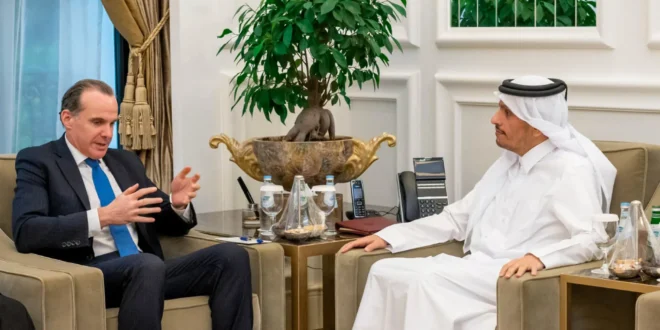The ceasefire deal between Israel and Hamas was on the brink of collapse, with Hamas accusing Israel of not upholding its part of the agreement and Israel threatening to restart its intense military campaign in the Gaza Strip.
This critical juncture saw the arrival of a Qatari jet at Israel’s Ben-Gurion International Airport on Saturday. The Qatari negotiators on board immediately set to work to salvage the ceasefire agreement before it disintegrated, potentially undoing weeks of high-stakes diplomatic efforts.
This first-ever public visit of Qatari officials to Israel, a country with which they have no formal diplomatic ties, highlighted Qatar’s significant role as a mediator in the conflict. Yoel Guzansky, a senior fellow at the Institute for National Security Studies in Tel Aviv, emphasized the unique influence of Qatar on Hamas due to its longstanding support.
The Qatari mission managed to keep the ceasefire intact, with most delegates returning home but some staying in Israel to work on extending the truce with Israeli intelligence. This extension is particularly crucial as the ceasefire was set to end on Tuesday morning.
Qatar’s involvement is pivotal due to its strong ties with the United States, its communication channels with Israel since 1995, and its substantial support for Gaza. Its position is further strengthened by its hosting of Hamas’ political office, allowing it influence over the group’s decisions.
Qatari officials maintain their involvement is driven by a desire to reduce conflict, despite criticism from Israel, some U.S. lawmakers, and Arab neighbors for their connections with various Islamist groups.
Patrick Theros, a former U.S. ambassador to Qatar, described this as a demonstration of Qatar’s soft power, used in alignment with American interests.
In the current ceasefire negotiations, Qatari mediators, along with Egyptian and U.S. counterparts, faced the challenge of fostering trust between Israel and Hamas. Amidst the ceasefire, Hamas had expressed concerns about Israel not fulfilling its promises, particularly regarding the flow of humanitarian aid into Gaza.
Face-to-face meetings between Qatari officials and Israeli authorities, including crucial discussions with Mossad in Tel Aviv, played a key role in ensuring the continuation of the ceasefire. This led to the release of a second batch of Israeli hostages, the liberation of 39 women and teenagers from prison, and provided a respite for Palestinians in Gaza to seek fuel and missing relatives.
Qatar’s assistant foreign minister visited Gaza to assess the aid situation and meet with affected Palestinians, including Al Jazeera’s Gaza bureau chief, who lost family members in an airstrike. Al Jazeera’s extensive coverage in Gaza has been influential in shaping the Arabic narrative of the war.
Despite their differences, both Israel and Hamas see the value in maintaining calm. Qatar continues to focus on immediate goals like upholding the ceasefire and preventing a wider regional conflict. High-profile visits to Doha, including those by Iran’s foreign minister, Lebanon’s caretaker prime minister, and the CIA director, reflect Qatar’s central role in these efforts.
Majed al-Ansari, spokesperson for Qatar’s Foreign Ministry, emphasized the potential for diplomatic solutions following the release of hostages and pauses in fighting.


